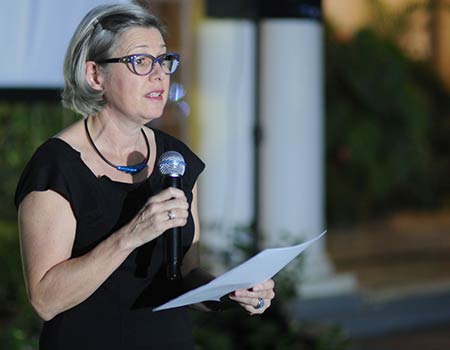Janet Jackson, UNFPA Country Representative, said that International Women’s Day was an opportunity to celebrate the advances of human rights as these relate to the full and equal participation of women and girls in society. She, however, added that there is still a great deal to be done and that public awareness of domestic violence is still low; a situation that is compounded by lack of any quantitative data to support policy and programming.
UNFPA has established 6 women and girl’s centres in Rakhine, supported by the Metta Foundation and the International Rescue Committee, which provide a safe space for women survivors of Gender-Based Violence (GBV). To date 4,000 women have visited these 6 centres, 80% of whom are survivors of GBV. In Kachin, a further 8 women and girl’s centres have been established in partnership with the Kachin Women’s Association. Women and girl’s centres are the cornerstone of UNFPA’s response to end GBV in Myanmar, providing life-saving health care and vital psychosocial services for women.

Janet Jackson said: “Prevention and response must go hand in hand in addressing violence against women and gender-based violence”. She continued that it is essential that survivors have access to services and that health and social workers are trained to detect and manage possible signs of GBV.
A preview of an episode from the new series “The Sun, The Moon, The Truth” was shown, which specifically focuses on the issue of domestic violence and the services that women can access for help. Grace Swe Zin Htaik, producer, spoke about why she felt it was important to break the silence and stigma surrounding GBV, which is prevalent in Myanmar – and many other – cultures. Daw Pansy Tun Thein, Co-Chair of the Gender Equality Network, explored this further when outlining their recently released report “Behind the silence: Violence against Women and their Resilience”. She also spoke about the Anti Violence Against Women law which is currently being drafted in Myanmar.
Wrapping up the event, the Myanmar Girls, the first Myanmar girl band, played a selection of their songs, including “Girl Strong”. Kimmy, the lead singer, emphasised that women should be independent and not dependent on their husband’s for their happiness.


